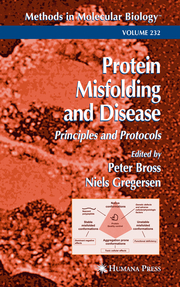-
Zusatztext
-
For decades it has been known that structured conformations are important for the proper functioning of most cellular proteins. However, appreciation that protein folding to the functional conformations as well as the structural maintenance of protein molecules are very complex processes has only emerged during the last ten years. The intimate interplay uncovered by this scientific development led us to realize that perturbations of the protein folding process and disturbances of conformational maintenance are major disease mechanisms. This development has given rise to the concept of conformational diseases and the broader signature of protein folding diseases, comprising diseases in which mutations or environmental stresses may result in a partial misfolding that leads then to alternative conformations capable of disturbing cellular processes. This may happen by self-association (aggregation), as in prion and Alzheimer's diseases, or by incorporation of alternatively folded subunits into structural entities, as in collagen diseases. Another possibility is that folding to the native structure is impaired or abolished, resulting in decreased stea- state levels of the correctly folded protein, as is observed in cystic fibrosis and 1-antitrypsin deficiency, as well as in many enzyme deficiencies. In addition, deficiencies of proteins that are engaged in assisting and supervising protein folding (protein quality control) may impair the folding of many other proteins, resulting in pathological phenotypes. Examples of this are the spastic paraplegia attributable to mutations in mitochondrial protease/chaperone complexes.
-
-
Kurztext
-
It has now become clear that a large number of diseases with very different pathologies share a common framework of protein misfolding, accompanied by degradation and/or aggregation of the misfolded proteins. In Protein Misfolding and Disease: Principles and Protocols, notable experts in conformational disease review the latest thinking about the molecular processes underlying these diseases and describe cutting-edge biochemical, genomic, cellular, and chemical laboratory techniques for studying their genesis and pathologies. The authors apply their carefully refined methods to a variety of metabolic and neurodegenerative disorders, as well as to the aging process. The techniques presented are broadly applicable in many diverse disease contexts and may be used in both diagnosis and detailed research on new treatment strategies. Each tried and proven protocol includes insightful background notes, lists of required equipment and reagents, step-by-step instructions, and tips on troubleshooting and on how to avoid known pitfalls. Comprehensive and cutting-edge, Protein Misfolding and Disease: Principles and Protocols offers both novice and experienced researchers a solid theoretical grounding in conformational disease and a remarkable set of analytical methodologies for uncovering its characteristics and generating new therapeutic approaches.
-
Detailansicht
Protein Misfolding and Disease
Methods in Molecular Biology 232
ISBN/EAN: 9781588290656
Umbreit-Nr.: 1511479
Sprache:
Englisch
Umfang: xv, 318 S.
Format in cm:
Einband:
gebundenes Buch
Erschienen am 20.06.2003


